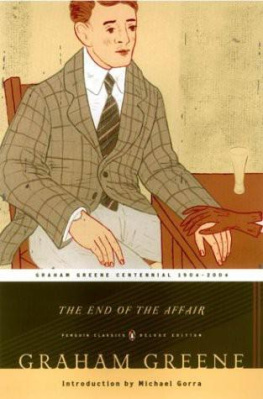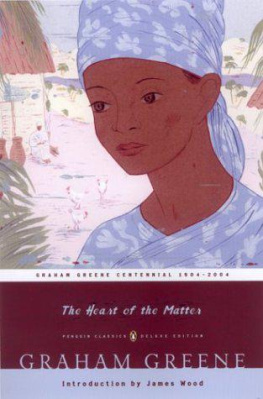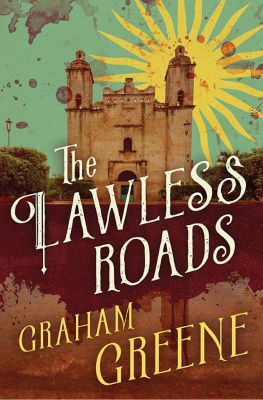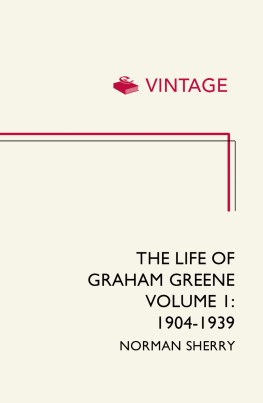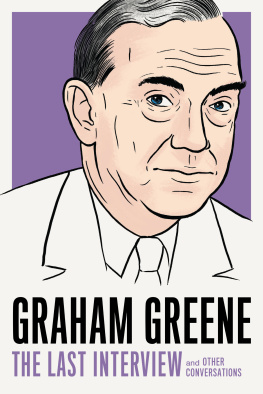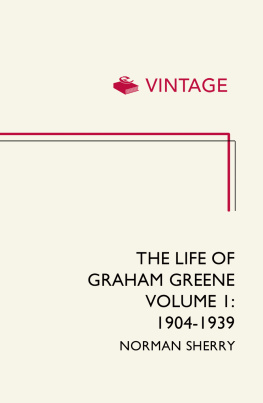Graham Greene - Brighton Rock
Here you can read online Graham Greene - Brighton Rock full text of the book (entire story) in english for free. Download pdf and epub, get meaning, cover and reviews about this ebook. genre: Humor. Description of the work, (preface) as well as reviews are available. Best literature library LitArk.com created for fans of good reading and offers a wide selection of genres:
Romance novel
Science fiction
Adventure
Detective
Science
History
Home and family
Prose
Art
Politics
Computer
Non-fiction
Religion
Business
Children
Humor
Choose a favorite category and find really read worthwhile books. Enjoy immersion in the world of imagination, feel the emotions of the characters or learn something new for yourself, make an fascinating discovery.

- Book:Brighton Rock
- Author:
- Genre:
- Rating:4 / 5
- Favourites:Add to favourites
- Your mark:
- 80
- 1
- 2
- 3
- 4
- 5
Brighton Rock: summary, description and annotation
We offer to read an annotation, description, summary or preface (depends on what the author of the book "Brighton Rock" wrote himself). If you haven't found the necessary information about the book — write in the comments, we will try to find it.
Brighton Rock — read online for free the complete book (whole text) full work
Below is the text of the book, divided by pages. System saving the place of the last page read, allows you to conveniently read the book "Brighton Rock" online for free, without having to search again every time where you left off. Put a bookmark, and you can go to the page where you finished reading at any time.
Font size:
Interval:
Bookmark:
The Boy lay on the bed. A cup of coffee went cold on the washstand, and the bed was sprinkled with flakes of pastry. The Boy licked an indelible pencil, his mouth was stained purple at the corners, he wrote: * 'Refer you to my previous letter" and concluded it at last: "P. Brown, Secretary, the Bookmakers' Protection..." The envelope addressed "Mr. J. Tate" lay on the washstand, the corner soiled with coffee. When he had finished writing, he put his head back on the pillow and closed his eyes. He fell asleep at once: it was like the falling of a shutter, the pressure of the bulb which ends a time exposure. He had no dreams.
His sleep was functional. When Dallow opened the door he woke at once. "Well?" he said, lying there without moving, fully dressed among the pastry crumbs.
"There's a letter for you, Pinkie. Judy brought it up."
The Boy took the letter. Dallow said: "It's an elegant letter, Pinkie. Smell it."
The Boy held the mauve envelope to his nose. It smelt like a cachou for bad breath. He said: "Can't you keep off that bitch? If Billy knew..."
"Who'd be writing an elegant letter like that, Pinkie?"
"Colleoni. He wants me to call in for a talk at the Cosmopolitan."
"The Cosmopolitan," Dallow repeated with disgust. "You won't go, will you?"
"Of course I'll go."
"It's not the sort of place where you'd feel at home."
"Elegant," the Boy said, "like his notepaper. Costs a lot of money. He thinks he can scare me."
"Perhaps we'd better lay off Tate."
"Take that jacket down to Billy. Tell him to sponge it quick and put an iron over it. Give these shoes a brush." He kicked them out from under the bed and sat up. "He thinks he'll have the laugh on us." In the tipped mirror on the washstand he could see himself, but his eyes shifted quickly from the image of smooth, never shaven cheek, soft hair, old eyes: he wasn't interested. He had too much pride to worry about appearances.
So that later he was quite at ease waiting in the great lounge under the domed lights for Colleoni; young men kept on arriving in huge motoring coats accompanied by small tinted creatures, who rang like expensive glass when they were touched but who conveyed an impression of being as sharp and as tough as tin. They looked at nobody, sweeping through the lounge as they liad swept in racing models down the Brighton Road, ending on high stools in the American Bar. A stout woman in a white fox fur came out of a lift and stared at the Boy, then she got back into the lift again and moved weightily upwards. A little Jewess sniffed at him bitchily and then talked him over with another little Jewess on a settee. Mr. Colleoni came across an acre of deep carpet from the Louis Seize Writing Room, walking on tiptoe in glac shoes.
He was a small Jew with a neat round belly--he wore a grey double-breasted waistcoat, and his eyes gleamed like raisins. His hair was thin and grey. The little bitches on the settee stopped talking as he passed and concentrated. He clinked very gently as he moved--it was the only sound.
"You were asking for me?" he said.
"You asked for me," the Boy said. "I got your letter."
"Surely," Mr. Colleoni said, making a little bewildered motion with his hands, "you are not Mr. P.
Brown?" He explained: "I expected someone a good deal older."
"You asked for me," the Boy said.
The little raisin eyes took him in: the sponged suit and the narrow shoulders, the cheap black shoes. "I thought Mr. Kite..."
"Kite's dead," the Boy said. "You know that."
"I missed it," Mr. Colleoni said. "Of course that makes a difference."
"You can talk to me," the Boy said, "instead of Kite."
Mr. Colleoni smiled. "I don't think it's necessary," he said.
"You'd better," the Boy said. Little chimes of laughter came from the American Bar and the chink, chink, chink of ice. A page came out of the Louis Seize Writing Room, called: "Sir Joseph Montagu, Sir Joseph Montagu," and passed into the Pompadour Boudoir.
The spot of damp, where Billy's iron had failed to pass, above the Boy's breast pocket was slowly fading out in the hot Cosmopolitan air.
Mr. Colleoni put out a hand and gave him a quick pat, pat, pat on the arm. "Come with me," he said. He led the way, walking on glace tiptoe past the settee, where the Jewesses whispered, past a little table where a man was saying: "I told him ten thousand's my limit" to an old man who sat with closed eyes above his chilling tea. Mr. Colleoni looked over his shoulder and said gently: "The service here is not what it used to be."
He looked into the Louis Seize Writing Room. A woman in mauve with an untimely tiara was writing a letter in a vast jumble of chinoiserie. Mr. Colleoni withdrew. "We'll go where we can talk in peace," he said and tiptoed back across the lounge. The old man had opened his eyes and was testing his tea with his finger. Mr. Colleoni led the way to the gilt grille of the lift. "Number fifteen," he said. They rose angelically towards peace. "Cigar?" Mr. Colleoni asked.
"I don't smoke," the Boy said. A last squeal of gaiety came from below, from the American Bar, the last syllable of the page boy returning from the Pompadour Boudoir: "Gu," before the gates slid back and they were in the padded sound-proof passage. Mr. Colleoni paused and lit his cigar.
"Let's have a look at that lighter," the Boy said.
Mr. Colleoni's small shrewd eyes shone blankly under the concealed pervasive electric glow. He held it out. The Boy turned it over and looked at the hall mark. "Real gold," he said.
"I like things good," Mr. Colleoni said, unlocking a door. "Take a chair." The armchairs, stately red velvet couches stamped with crowns in gold and silver thread, faced the wide seaward windows, and the wrought-iron balconies. "Have a drink."
"I don't drink," the Boy said.
"Now," Mr. Colleoni said, "who sent you?"
"No one sent me."
"I mean who's running your mob if Kite's dead."
"I'm running it," the Boy said.
Mr. Colleoni politely checked a smile, tapping his thumb nail with the gold lighter.
"What happened to Kite?"
"You know that story," the Boy said. He gazed across at the Napoleonic crowns, the silver thread.
"You won't want to hear the details. It wouldn't have happened if we hadn't been crossed. A journalist thought he could put over one on us."
"What journalist's that?"
"You ought to read the inquests," the Boy said, staring out through the window at the pale arch of sky against which a few light clouds blew up.
Mr. Colleoni looked at the ash on his cigar; it was half an inch long; he sat deep down in his armchair, and crossed his little plump thighs contentedly.
"I'm not saying anything about Kite," the Boy said.
"He trespassed."
"You mean," Mr. Colleoni said, "you aren't interested in automatic machines?"
"I mean," the Boy said, "that trespassing's not healthy."
A little wave of musk came over the room from the handkerchief in Mr. Colleoni 's breast pocket.
"It'd be you who'd need protection," the Boy said.
"IVe got all the protection I need," Mr. Colleoni said. He shut his eyes; he was snug; the huge moneyed hotel lapped him round; he was at home. The Boy sat on the edge of his chair because he didn't believe in relaxing during business hours; it was he who looked like an alien in this room, not Mr. Colleoni.
"You are wasting your time, my child," Mr. Colleoni said. "You can't do me any harm." He laughed gently. "If you want a job though, come to me. I like push. I dare say I could find room for you. The world needs young people with energy." The hand with the cigar moved expansively, mapping out the world as Mr. Colleoni visualised it: lots of little electric clocks controlled by Greenwich, buttons on a desk, a good suite on the first floor, accounts audited, reports from agents, silver, cutlery, glass.
Next pageFont size:
Interval:
Bookmark:
Similar books «Brighton Rock»
Look at similar books to Brighton Rock. We have selected literature similar in name and meaning in the hope of providing readers with more options to find new, interesting, not yet read works.
Discussion, reviews of the book Brighton Rock and just readers' own opinions. Leave your comments, write what you think about the work, its meaning or the main characters. Specify what exactly you liked and what you didn't like, and why you think so.

